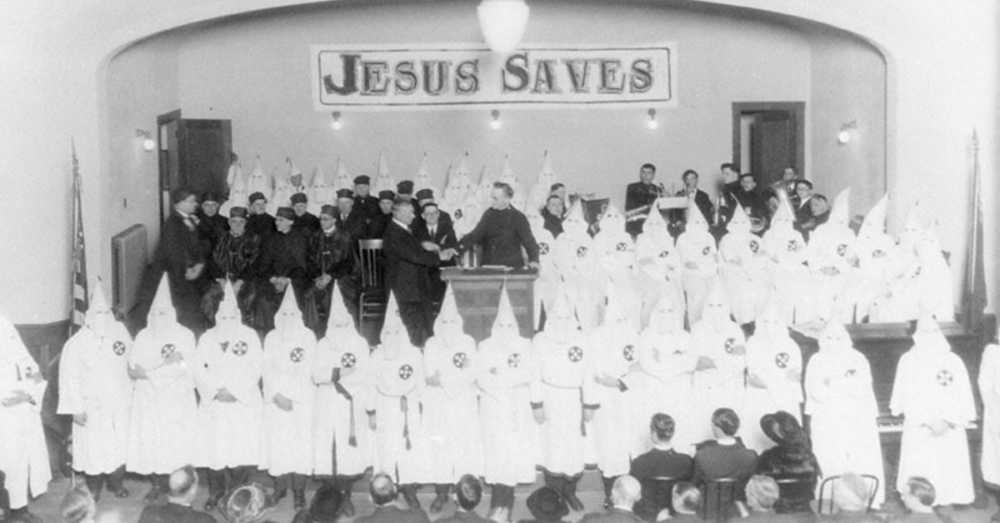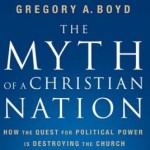We run our website the way we wished the whole internet worked: we provide high quality original content with no ads. We are funded solely by your direct support. Please consider supporting this project.

Jesus was Not a [Socialist]
Article by Dan Kent
Our political climate right now exhausts me. The fracturing. The bullying. The ideological mobs. I feel like I’m surrounded by a hundred Towers of Babel babbling at me all day long, pummeling me with endless propaganda and page-after-page of facts. “Look at the facts!” they implore. They want me in their tower, on their team, in their mob.
I’ve grown a thick skin to most of the noise, but when they claim Jesus as a member of their mob, well, I get worked up. Every tower seems to think they have Jesus inside. Do a Google search for “Jesus is a…” and you’ll discover that Jesus was a libertarian, a communist, a republican, a democrat, an anarchist, a baseball fan—I even found a picture of a KKK rally in Portland celebrating Jesus!

Give me an argument for your political perspective, and I’ll listen. But as soon as you say “Jesus was a [BLANK],” you lose me. “You have one teacher, the Messiah,” Jesus said, establishing himself as a source of truth that surpasses all towers (Matthew 23:10). Portraying Jesus as a member of our political tower subverts Jesus’ authority and demotes Jesus to a student of our little ideology.
Please consider abandoning all efforts to establish Jesus as an ambassador for your political view. Stop taking Jesus hostage in your tower! Besides being hopelessly unpersuasive (everybody believes Jesus resides in their own tower), the tactic misrepresents Jesus’ teaching in a profound and dangerous way.
Consider socialism.
Socialism boasts ideals that look very similar to things Jesus teaches. Like socialism, Jesus cared about feeding the poor, and had warnings for the rich (see Luke 6:20-25). Socialism, or democratic socialism, seeks to eliminate economic poverty and to constrain wealth, and so it looks very much like what Jesus taught. But the similarity is an illusion. Socialism seeks to realize its vision through government. Jesus seeks to accomplish his vision through discipleship. Government and discipleship are deeply contrary to one another.
(1) Government controls from the outside-in, discipleship transforms from the inside-out.
Government gets what it wants through external pressure: laws, punishments, incentives, and things like that. Discipleship triggers an internal transformation that compels us to willingly live the way Jesus calls us to live.
Jesus cares about one’s economic condition, for sure. But he cares about the condition of one’s heart even more. A heart overflowing with agape love will share freely with brothers and sisters, without external pressure. Only whole and secure hearts can maintain meaningful economic equality. Trying to secure and maintain economic equality from the outside-in will only lead to contention, resistance, and violence, as history has shown many times over.
If Jesus wanted economic equality above all else, like socialism does, he could have accomplished that with ease. He could have exerted his divine authority in the political realm and established an unstoppable democratic socialism that would have perfectly balanced the economics of every earthly society. This fact grounded Satan’s greatest temptation: control over all the kingdoms of the earth (Matthew 4:8-9), but Jesus rejected this path.
He never pressured anyone from the outside-in to liquidate their assets. Jesus was not Robin Hood. He did not redistribute anyone’s wealth. He appealed to each person’s heart and, if they were ready to answer that appeal, he celebrated them (Luke 19:8-10). If they were not ready, he let them be what they were (Luke 18:18-25). He never settled for political shortcuts to spiritual problems.
Government is all about managing people and resources. Anytime you have a group of people, things need to be managed. So we must have government. But we do not have to devote ourselves to government—or a political ideology for that matter. When you step back a little, you see that every political ideology, like democratic socialism, is simply a philosophy of managing people and resources.
But Discipleship is all about becoming the types of people who do not need to be managed. People who share what they have, love their neighbors, serve the stranger, and help the disadvantaged don’t need to be managed. But these are exactly the types of behaviors you can’t force through government management. They only emerge from the power of discipleship, submitted under Jesus, who alone justifies the crazy, imprudent, self-sacrifice that meaningful equality requires.
Socialist government strives for economic equality and must eventually wrestle for economic compliance with force. They must conquer the unwilling with power. Jesus confronts us with a teaching and a reality that transforms us from the inside-out, shaping our hearts into powerful forces of charity and agape-willingness, from our own hearts and on our own terms.
(2) Government focuses on ends, discipleship focuses on means.
In government, the ends often justify the means. It doesn’t often matter what you say or do to people as long as you get the results you want. “It’s just politics,” we say. You find this mentality in any political group, even socialists, whose intentions seem so good. In fact, since they are so nobly fighting for the poor, the inclination to shrewd and cut-throat behavior might be even greater, as the perceived righteousness of their ends can justify, in their own minds, greater compromise in their deeds.
But in discipleship the ends do not justify the means. To the contrary, how we treat people is the whole show! The means are everything. It doesn’t matter if we get what we want if we treat people in ways that are not Christ-like.
This is not to say that as a disciple we must stay away from politics. My point is that we can only devote ourselves to one or the other, because they are so deeply contrary to one another and they both seek to shape us into their image. I like to think of it this way: The better a person gets at sumo wrestling the less effective they will be at competitive swimming. You can only excel at one.
Conclusion:
Ideological towers surround us and lobby us to join their force. They want us to brand ourselves with their branding. They want us to consider ourselves one of them, to submit our identity to theirs, to declare to the world “I am a [whatever]!” But disciples of Jesus are ambassadors for Jesus only, so we can lovingly reject all branding. We are Towerless Apostles, submitted and devoted to one Teacher, secured in God’s love. We can listen to the propaganda, we can have opinions, but our trust is in our Teacher, who transforms us in deep places, then calls us out into the world to revolutionize humanity, one person at a time, from the inside-out.
See Part Two HERE.
Category: Guest Contributor
Tags: Discipleship, Political Idolatry, Politics
Topics: Ethical, Cultural and Political Issues
Guest Contributor:

Daniel Kent has authored several books, including Confident Humility: Becoming Your Full Self Without Becoming Full of Yourself, and the series The Training of KX12. He also produces and hosts ReKnew’s Podcast Greg Boyd: Apologies & Explanations and serves as editor-in-chief here at ReKnew.org.
Related Reading

God and Our Political Platforms
Rachel Held Evans posted a blog today on the stir created when Democrats booed the passing of “an amendment to the party platform reinstating language that identified Jerusalem as the rightful capital of Israel and that referred to people’s “God-given potential” in its preamble.” Of course this fed into the belief that if you’re a…

Christians & Politics: Where Do You Stand?
In the 1980’s, Cal Thomas and Ed Dobson were leaders in the Moral Majority, a conservative evangelical social and political movement that attempted to rally “moral” people to change public policy. The movement died out in the 1990s. In 1999, Thomas and Dobson wrote a book entitled Blinded by Might in which they declare that…

What Does it Mean to be a Disciple?
http://youtu.be/zZVBV3zByys Here’s our good friend Bruxy Cavey talking about what it means to be a disciple of Jesus and to call him “Lord.” It’s less than three minutes, but it’s a good reminder of what we’re doing when we enter into a submitted relationship with Jesus. Check it out!

A Response to Tony Campolo on Taxes
In this and the next several blogs that I’ll be writing, I’d like to respond to views of Tony Campolo on several topics related to Christians and politics. I have had the privilege of dialoguing with Tony several times and even publicly debating him once on this top. And while I have the utmost respect…

“The kingdom of God…advances only by exercising power under others. It expands by manifesting the power of self-sacrificial, Calvary-like love.” [Quotes]
“While all the versions of the kingdom of the world acquire and exercise power over others, the kingdom of God, incarnated and modeled in the person of Jesus Christ, advances only by exercising power under others. It expands by manifesting the power of self-sacrificial, Calvary-like love.”

Should Christians Arm Themselves?
Jerry Falwell Jr, the president of Liberty University, recently encouraged the students to arm themselves saying, “I always thought that if more good people had concealed-carry permits, then we could end those Muslims before they walk in and kill.” In the light of Christ’s teaching, what should be our response? First, the NT is quite…
